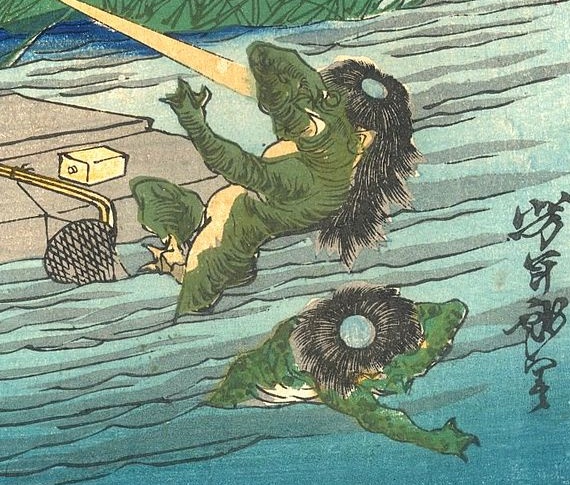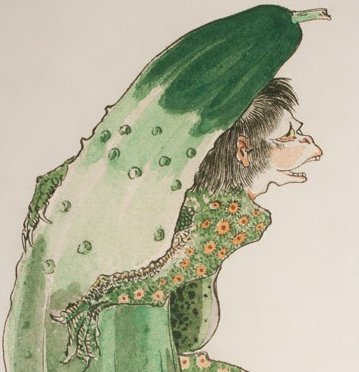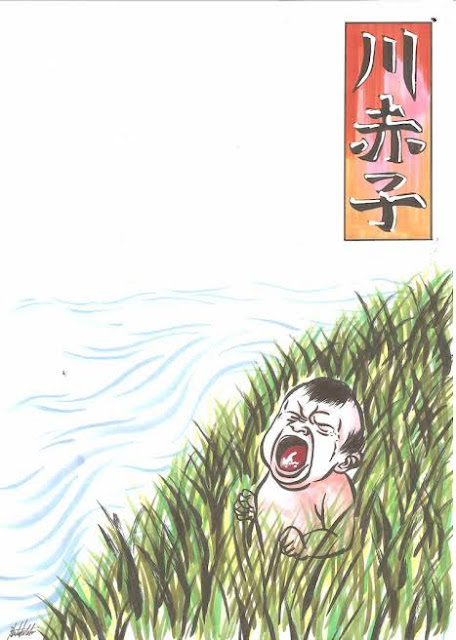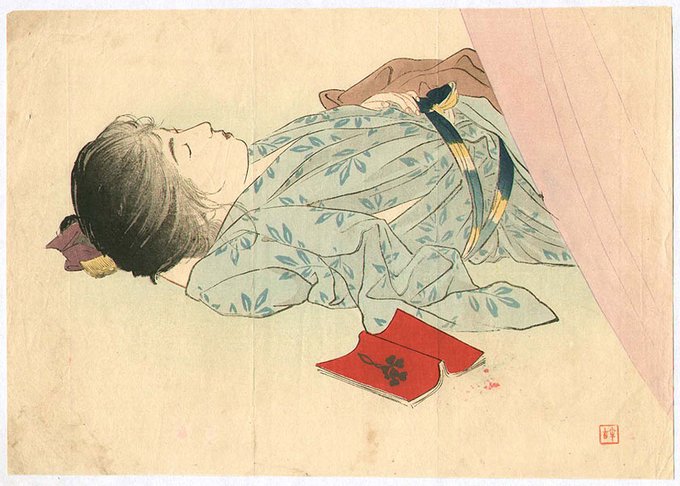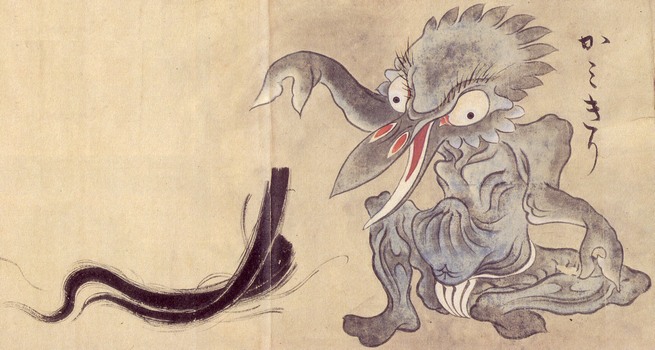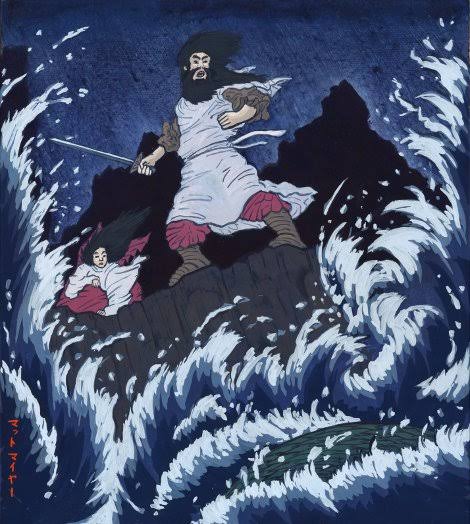JapaneseFolkloreのTwitterイラスト検索結果。 160 件中 5ページ目
In #JapaneseFolklore it is believed that lakes and ponds are inhabited by guardian kami (gods). These kami vary but often take the form of dragons, catfish, giant snakes or eels. There are stories of these water gods interacting positively with humans, such as...
#SwampSunday
1/5
In #JapaneseFolklore, Jizo is
a guide & protector of the souls of children, especially those who have died. Parents whose children die before them often pray to the god Jizo & ask him to protect their lost children as it is believed that their souls can't...
#FairyTaleTuesday
1/2
In #JapaneseFolklore there is a tale about the ghost of Okiku, a beautiful servant who was killed because she refused the affections of a man who subsequently killed her and threw her down a well. Part of his plan was to trick her into believing that she had...
#WyrdWednesday
1/2
In #JapaneseFolklore ghosts are known as yurei and ghost tales as kaidan. Many y urei are also onryo, which are vengeful ghosts who return to seek revenge on those who hurt or betrayed them. Some of the most famous tales are those of Oiwa, Okiku and Kasane.
#WyrdWednesday
1/2
One of the most well-known #yokai in #JapaneseFolklore is the kappa. A cucumber-loving water goblin that lives in rivers and lakes, this yokai has been known to grab passers-by and drag them to a watery death. More info and art here:
https://t.co/89P7gosdDd
#FairyTaleTuesday
In #JapaneseFolklore, Kodama are the spirits of trees. While they are attached to specific trees, they can also move freely through forests often appearing as glowing orbs of light. In some accounts they present as regular trees but with the ability to...
#FolkloreThursday
1/3
Trees play an important part in #JapaneseFolklore. In Shinto they are considered sacred and are believed to possess a spirit. While Totoro from the Studio Ghibli film is a fictitious character, it was no doubt inspired by the animistic beliefs of Japan.
#WyrdWednesday
1/2
“The Tale of the Bamboo Cutter”
Princess Kaguya’s story is so interesting and melancholy.
Mixed media painting - mostly watercolors with digital elements.
#princesskaguya #watercolor #mixedmedia #taleofthebamboocutter #japanesefolklore #folktale
Kawa akago are a type of #yokai from #JapaneseFolklore believed to be related to kappa. They appear as red-skinned babies, lurking in the reeds near waterways. They cry out, sounding exactly like a real baby, to lure passers-by closer to the water's edge.
#FairyTaleTuesday
1/2
In #JapaneseFolklore kanashibari is the term used for sleep paralysis, which can feel like the real and dream worlds are mixing. In ancient times, this phenomenon was attributed to supernatural forces, and in some cases spirit possession by yokai.
#FairyTaleTuesday #yokai
1/4
There are also tales of Kamikiri taking forms other than insects and possibly even being kitsune (foxes) in disguise.
#yokai #JapaneseFolklore
🎨1. Matthew Meyer
2. 'Kamikiri' from the Hyakkai Zukan by Sawaki Suushi
3. 'Hair-cutting Mysterious Tale' - Utagawa Yoshifuji, 1868.
2/2
Kintaro, the Golden Boy is a famous character in Japanese folklore was brought up in the forest, became friends with the animals & is super strong. In modern Japan he is viewed as a symbol of great fortune for young boys. Art by @ivanbarreraart
#kintaro #japan #japanesefolklore
In Japanese folklore, tales are told of yonaki-ishi or night-crying stones. These stones cry loudly at night and it is believed to be because they are possessed by a spirit, usually of someone who has been murdered and is seeking revenge.
#FolkloreThursday #JapaneseFolklore
1/3
If you need a daily dose of #folklore, I recommend these hashtags:
#MythologyMonday #FairyTaleTuesday #WyrdWednesday #FolkloreThursday #FaustianFriday #SuperstitionSat
You may also like:
#JapaneseFolklore #yokai #GothicSpring #OwlishMonday #ukiyoe #preraphaelite #Caturday
... married Kushinadahime. They had five children, one being the god Okuninushi. He is also associated with marriage. Today Susanoo is still widely worshipped & is considered a cultural hero.
#JapaneseFolklore
🎨1. Yoshitoshi
2. Kuniyoshi
3. Via Shinto Cocoro
4. Matthew Meyer
4/4
In #JapaneseFolklore, the now extinct Japanese wolf features as okuri-okami (or sending off wolf) who trails closely behind travellers, appearing to be sending them on their way and even guiding them to their destination safely. However, there's a catch...
#FolkloreThursday
1/2
Here’s one of the characters that will be part of my new Japanese Folklore collection! What a good cow! Does anyone know the folklore behind cows and the Tenman-gū shrine? 😊 I hope you’ll all look forward to learning more soon ✨ #originalart #japanesefolklore #cow
In #JapaneseFolklore, Kodama are the spirits of trees, similar to dryads of Greek mythology. While they are attached to specific trees, they can also move freely through forests and can appear as glowing orbs of light. They maintain the balance of nature.
#FolkloreThursday
1/2
In #JapaneseFolklore kappas are a type of water goblin that can be very dangerous. They absolutely love cucumbers though, so if you're near water, keep a few handy in case you need to distract the kappa for long enough to escape.
#FolkloreThursday #yokai
1/2












